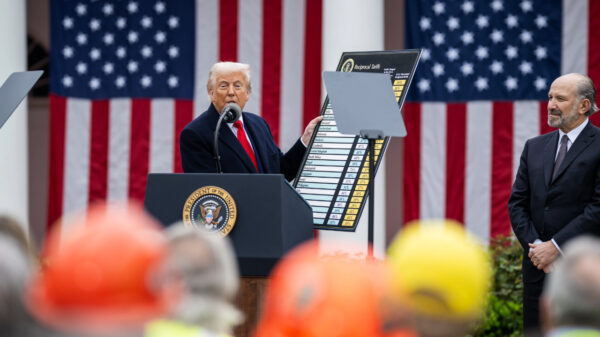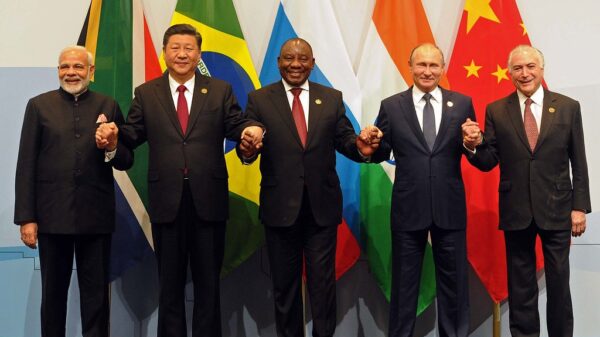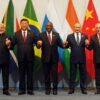Roar writer Andrea Tonon argues that China is emerging as a challenger to the United States for the title of global superpower
Today, we could witness a return of a global power struggle due to the rise of China. After the Cold War, the US became a global hegemony, and for many people the American machine is still the dominant force within the international community. But all of this could be questioned very soon, that is if it’s not already being challenged.
The rise of China among the great powers of the world began in the late 1970s, particularly with President Deng Xiaoping. He started a series of reforms to drastically change the global position of China. Due to China’s size and potential economic and military power in East Asia, its hegemonic position in the region became clear. It is important to emphasise the clever strategy that Deng put in place in order to gain regional power step by step. He used the so-called “keeping a low profile†approach, while growing economically, militarily and geopolitically.
There is no doubt that China today is a superpower in every respect. According to several scholars China has already become a global hegemon in recent years, threatening the position of the United States and the entire Western world. The UK-based Centre for Economics and Business Research (CEBR) believes that China will overtake the US to become the world’s largest economy by 2028, five years earlier than as many scholars predicted. This acceleration is partially due to the Covid-19 pandemic.
What does it mean to be a hegemon?
The term hegemony was coined by the Italian Marxist politician and philosopher Antonio Gramsci. It derives from the Greek term “hÄ“gemonia” meaning “dominance overâ€. According to the political scientist, Joseph Nye “The term hegemony is applied to a variety of situations in which one state appears to have considerably more power than others…All too often, hegemony is used to refer to different behaviours and degrees of controlâ€.
Gramsci developed the theory of cultural hegemony, in which an ideology is used to reflect the beliefs and interests of the ruling class or group that controls the rest of society. Control is achieved through hard power such as military action, economic might, coercive diplomacy, and soft power like humanitarian aid, education, religious dogmas, cooperation and the use of international organizations. Nowadays there are four crucial components to be classified as a hegemonic power; a powerful military, large economy, strong culture and political/geopolitical hegemony.
Many believe China has achieved at least three of the four categories, namely military, economic and political dominance. As we have already mentioned above it is only a matter of time for China to become the largest economy in the world. Not to mention, China is already one of the fastest growing economies among the BRICS members (Brazil, Russia, India, China, and South Africa). In fact, Goldman Sachs estimates that all BRICS economics will dominate the global economy by 2050.
What about military and geopolitical power?
Even though the US spends more on its military than any other country in the world, it may not last. The aim of China’s Belt and Road Initiative is to connect more than 70 countries in Asia, Europe and Africa, recreating a “new Silk Roadâ€. The main goal is to build new, modern infrastructure projects in the three continents to promote new economic integration between strategic countries for China with Beijing at the centre.
Though numerous critics argue that this initiative is only for infrastructural and economic reasons, the real motive for the creation of this “new silk road†is to extend the military and geopolitical influence of Beijing abroad. The evidence is several military bases built in Africa, for example the one in Djibouti, and bilateral treaties signed to increase China’s diplomatic influence in different regions of the world. Another example of Chinese military expansion are its the activities carried out in the South China Sea, considered to be international waters by law.
For many political thinkers, a powerful economy and army are enough to make a country a hegemon in today’s world. Of course, we could argue the merits of this statement, but it is clear that China changes the balance of power-relations between countries and creates a new conflict within the international community.
China has become an economic and political actor that is indispensable worldwide. In fact, last year China became the EU’s biggest trading partner, overtaking the US. Trade relations between China and the EU are worth $709 billion. This means that China is increasingly playing a key role in Europe and a central one at the international level. During a conference of the “ConnectIT series 2020-2021” organised by the KCL Italian Society, Federica Mogherini, a former Vice-President of the European Commission, stated that a stronger partnership between China and the EU could represent the most sensitive wedge issue between the EU and the US.
Maybe today we are witnessing the transition from the United States of America to China as the new global hegemon. Should we worry about it?
Specifically regarding human rights violations, the reputation of the United States is not pleasant due to several social structural problems, such as institutionalised violence and discrimination. Historical events notably the Iraq War, the Vietnam War, and many others also raise doubts.
But China has shown that it has no qualms in violating human rights. The world has witnessed their brutality in Hong Kong with the pro-democracy protests, the constant threats to Taiwan and the repression conducted under the guise of “anti-separatism†or “counter-terrorism†in the Xinjiang Uighur Autonomous Region and Tibetan-populated areas.
Muslim ethnic groups in Xinjiang have been deported to “re-education centresâ€. There are reports that China has started a sterilisation program of women belonging to specific Muslim groups. The Chinese government has been largely silent on the issue but has denied such accusations despite the overwhelming evidence of the existence of such centres and programs.
Does Europe and the rest of the world want to see China as the new hegemony?
Between China and the US, Europe certainly has many reasons and interests to be closer to the US because they both share a liberal democratic framework. The United States has the potential to maintain a liberal attitude and respect for human rights internationally.
Perhaps if Europe would give up nationalist sentiments, it could play a much important and responsible role withing the international community. The same thought could be applied to South and Central American countries with the leadership of a more liberal Brazil and a stronger, less corrupt Mexico.
Today as never before we could witness a world that is not subject to a single power, but to many. Or we will probably continue to see a power struggle between the US and China over the position of world hegemon. But as many believe, China is already winning this battle.
















